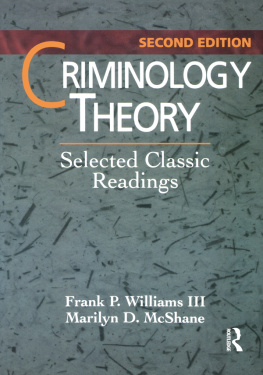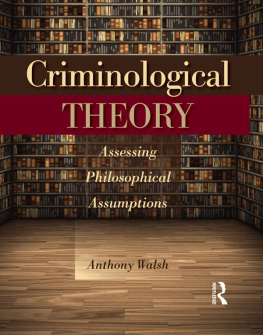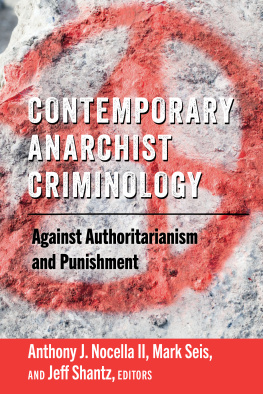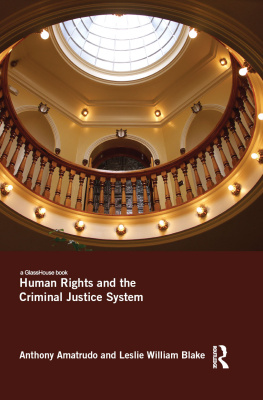Criminology and Political Theory
Criminology and Political Theory
Anthony Amatrudo
Anthony Amatrudo 2009
First edition published 2009
Apart from any fair dealing for the purposes of research or private study, or criticism or review, as permitted under the Copyright, Designs and Patents Act, 1988, this publication may be reproduced, stored or transmitted in any form, or by any means, only with the prior permission in writing of the publishers, or in the case of reprographic reproduction, in accordance with the terms of licences issued by the Copyright Licensing Agency. Enquiries concerning reproduction outside those terms should be sent to the publishers.
SAGE Publications Ltd
1 Olivers Yard
55 City Road
London EC1Y 1SP
SAGE Publications Inc.
2455 Teller Road
Thousand Oaks, California 91320
SAGE Publications India Pvt Ltd
B 1/I 1 Mohan Cooperative Industrial Area
Mathura Road
New Delhi 110 044
SAGE Publications Asia-Pacific Pte Ltd
33 Pekin Street #0201
Far East Square
Singapore 048763
Library of Congress Control Number 2008925136
British Library Cataloguing in Publication data
A catalogue record for this book is available from the British Library
ISBN 978-1-4129-3049-9
ISBN 978-0-4129-3050-5 (pbk)
Typeset by C&M Digitals (P) Ltd., Chennai, India
Printed in India at Replika Press Pvt Ltd
Printed on paper from sustainable resources
For John Charvet
CONTENTS
ACKNOWLEDGEMENTS
First, I would like to thank Dr Marianna Hordos for many years of friendship, dramas, intellectual sword fencing, laughter and good times in Budapest, London and elsewhere. Prof. Colin Sumner is a great writer, teacher, controversialist, convenor of seminars and raconteur, and he will always rank first in my list of criminological influences. I shall never forget attending a seminar Colin convened on the use of cutlery, and its relevance to the way we ordinarily suppress violence in our daily lives. It ranged effortlessly across academic disciplines, such as Jurisprudence, Political and Social Theory, Anthropology and Ethics avant-garde, sublime. Prof. Robert Fine, who examined my thesis at the LSE, remains a model of clarity and humane exegesis. Prof. Robert Hancke clarified my thinking on Political Economy and was great company at the CEU. Dr Bjorn Weiler has been a good friend, and occasional critic, for a decade and a half: his concern for history has certainly influenced my approach. I am grateful to Leslie Blake for various formal dinners and cut-and-thrust curries in, or around, Lincolns Inn. Another lawyer, Matthew Smith, I met when we were both keen rugby-playing students at Cambridge University and today I benefit from his jobbing barristers take on the law and the criminal justice system. Dr Magnus Ryan, from his ivory tower at All Souls College, has never been anything less than a supportive friend and our wide-ranging conversations, over beers, have certainly influenced the course of my thinking. I enjoyed the nursery food, ale and Bohemian company provided by the Chelsea Arts Club, whenever Dave Ryan signed me in, where the subject of crime always got a good airing. At the University of Sunderland I have the pleasure of teaching some excellent students and benefit from working with some wonderfully supportive colleagues. I am indebted to the Master and Fellows of St Edmunds College, Cambridge for electing me to a visiting research position, which assisted me in the writing of this book. The lavish hospitality and warm collegiality of the Political Science Department at the Central European University in Budapest, while I was a Visiting Fellow there, was an invaluable intellectual fillip. The Wissenschaftszentrum Berlin fr Sozialforschung generously allowed me to use their library and facilities. The librarians at the Institute of Criminology in Cambridge, LSE, and the IALS have been enormously helpful to me. Caroline Porter has been a wonderful editor at Sage and I owe her a great deal for so much excellent advice and support. For various kindnesses, inspiration and help, over the years, I have to thank: Prof. Rodney Barker; Prof. Lisa Bernstein; Blackheath Rugby Club; Deborah Bowen; Richard Buckwalter; Jake and Dinos Chapman; Dr Tom Cockcroft; Lucy Crawford; Vanessa Dietzl; Terence Dowle; Prof. Cecile Fabre; Nicole Fabre; Jan Farndale; Prof. Michael Freeman; Dr Matteo Fumagalli; Dr Loraine Gelsthorpe; Dr Volker Grundies; Ulrike Haas; Claudia Haupt; Dr Keith Hayward; Prof. David Held; Dr Felicia Herrschaft; Tabitha Howard; Valeska Huber; Waldemar Januszczak; Kate Jones; Elene Khatseva; Magdalena Krajewska; Sir Ivan Lawrence QC; Dr Ori Lev; Yana Loukiantseva; Prof. Steven Lukes FBA; Dr Tim Megarry; Rev. Dr Anthony Meredith SJ; Prof. Brendan OLeary; Mike Presdee; Prof. Fred Rosen; Miss Jamie Rubenstein; Dr Alessandra Sarquis; Monika Schroeder; Barry Sheerman MP; Dr Carsten Sneider; Camilla Soar; Prof. George Steiner FBA; Ligia Teixeira; Dr David Thomas QC; Prof. Steve Uglow; Prof. Andrew von Hirsch and Dr John White. My greatest intellectual debts, however, are to Prof. John Charvet. As a scholar, and as a man, John is without peer in my opinion.
THE NATURE OF THE STATE
Political power is, of course, always coercive power backed by the states machinery for enforcing its laws. But in a constitutional regime political power is also power of equal citizens as a collective body: it is regularly imposed on citizens as individuals, some of whom may not accept the reasons widely believed to justify the general structure of political authority (the constitution); or when they do accept that structure, they may not regard as well grounded many of the laws enacted by the legislature to which they are subject.
John Rawls, 2001
Introduction
The nature of the state is a topic which divides criminologists. There are those who see it as a neutral instrument which upholds civic order or which supports citizens through a system of benefits and support and there are those who see the state as either having interests of its own or advancing the interests of a specific class of persons, in whose interests it governs. The idea of justice as fairness rests upon the idea that the state is a neutral entity and it is fair to say that the liberal tradition within Criminology has tended either to neglect the state or to rely, wholesale, upon liberal political theorists, such as John Rawls and his conception of social cooperation among equals for mutual advantage. The Marxist and Feminist traditions within Criminology have a far richer body of writing about the state and more generally about state control and social regulation. This chapter will set out the main ideas used in contemporary Criminology, either explicitly or implicitly, concerning the nature of the state.
The State
The state is, arguably, the most contested term in political theory and it may refer to a great many different things, such as a philosophical or ideological category, an institution, a territorial power or a functional organising principle. It is a topic covered extensively in the writings of political philosophers since classical times,
The two most important features for criminologists are the first and third features. The first feature, that the state is a particular form of political organisation, is the dominant notion at work in contemporary Criminology. It is the view of Karl Marx, who wrote in






